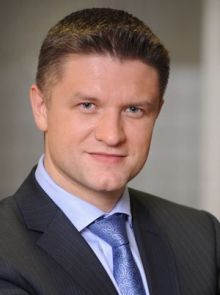The Ukrainian information technology market is awakening from almost two years of lethargy caused by the financial crisis. Despite some positive dynamics in 2010, the market failed to make up for the previous collapse. What is its status in 2011? How will the cabinet’s bill on preferential taxation in the IT sphere affect it? More on this in the following interview with Dmytro SHYMKIV, director general, Microsoft Ukraine.
Has your company felt that this crisis is slackening off?
“We did well last year, as evidenced by good sales dynamics. The Ukrainian IT market is showing the best progress in Eastern Europe. In Europe, the average IT market growth is 5-6 percent a year; in Russia, it is markedly higher. Our rate surpasses even that of the Russian market, but quick recovery is a big problem, considering the 45-50 percent decline in Ukrainian business during the crisis. The market has reached bottom and growth has started in a number of economic sectors, but price increases and the lowering purchasing power index are still affecting software sales.”
What task has Microsoft Ukraine set itself this year?
“We plan to reach the pre-crisis sales level by the end of 2011 and count on more than 30 percent growth. All told, there are five priorities. First, there is cloud computing and the relevant hardware. Let me explain. Every day we access the Internet and use search engines like Twitter, Facebook, Intouch, and so on. All these services are in a virtual cloud and the customers have no idea where either one was generated, and this isn’t important for them. The important thing is that they help find data. We use various devices to access them, like telephones, PCs, digitizers, and so on. Microsoft Ukraine will pay special attention to the development of such devices and new cloud computing services for Ukrai-nian companies.
UKRAINIAN PROGRAMMERS CATERING TO THE WEST
“The second priority is dealing with developers/implementers. Ukraine places second in Eastern Europe as to the number of programmers. There’s a lot of potential, but it is currently working mostly for foreign companies. They send their pay to salary cards opened in foreign banks. We want to see Ukrainian companies make money by developing the latest technologies.
“The third priority is participation in the generation of ideas, the implementation of projects initiated by the government, and collaboration within the framework of national education projects. All this is aimed at enhancing Ukraine’s competitiveness. Number four is regional expansion, finding more partners. Number five is combating piracy.”
You mentioned involvement in government projects. What do you think about the idea of e-government? Did you offer to help the authorities?
“Computerized local government is an element of democracy; it increases transparency and competitiveness. This is something Ukraine badly needs, especially considering its ratings in terms of simplified business procedures. A uniform nationwide electronic system would make relations between state and citizens dramatically easier while making the whole process even more transparent. There are successful examples: Norway, Belgium, and France with their single-window government-citizenry links. It is also true that a computerized workflow is already being practiced by some top-level authorities (e.g.: the Cabinet of Ministers and the Ministry of Economy) and some on the local level (in Vinnytsia and Slavutych). We did offer our help, but this requires a clear vision of the end result.”
What new products will the Ukrainian consumers be offered this year?
“The first Windows Phone 7 mo-del is already available. We’re working on additional cloud computing services. Microsoft Office 365, for example, allows to use both MS software and cloud computing, and you pay only for the actual usage. We also expect to launch Microsoft Lync, which allows for audio, video, and email communication, as well as press conferences, project presentations, and recording them all. Microsoft Ukraine will be the first in Europe to transfer to a new platform.”
Talking of your company’s regional expansion, does this mean that you will bet on small and medium businesses? If so, do you intend to adjust your marketing campaign, considering that crisis-stricken companies are still counting every cent?
“We’re actively collaborating with small and medium businesses, because that’s where most unlicensed software is still being used. Also, small- and medium-level businessmen have but a vague or no idea about where they can buy licensed products. Not so long ago, we carried out a special sales project that spelled 10 percent discount for such businesses. It proved a success. Our company is prepared to make special offers to customers, with an eye to their needs, because some only need email and workflow utilities while others also want user interfaces.”
Will your discount system apply to publishing companies or newspapers?
“Our company will be prepared for such discounts if and when a considerable part of publishing businesses are united and agree to purchase licensed software. After all, Russia offers a vivid example. Its Publishers’ Association undertook to buy a certain amount of software for its members and the selling company made them a special offer.”
UKRAINIAN STUDENTS HAVE DEVELOPED SOFTWARE THAT ALLOWS TO OPERATE PC WITH ONE’S EYES
You said once that you’d like to see a Ukrainian company make money using intellect rather than outsourcing techniques. What do you think should be the first step in this direction? Can you see such a company emerge in Ukraine before long?
“This is my long-cherished dream. Our company has been making every effort to make this dream come true. Every year we organize Imagine Cup (IC), the world’s premier student technology competition. This year we even have a school student’ team’s application. This year Ukraine is the world’s seventh IC applicant (6,300 applications).
“What this competition is all about is that a student team conceives an IT idea, develops it, submits it to the jury, and then tries to implement it. In 2010, Ukrainian students developed software that allowed one to operate a PC by moving one’s eyes. This project was meant for physically handicapped individuals.
“This year we will have leading Ukrainian investment and ventures market operators on the Imagine Cup jury, so they can spot the promising ideas that need funding. There are very good IT ideas in Ukraine, but the students, their authors, don’t know how to make them work in business. This is where we step in and offer a helping hand.”
They’re working on a bill aimed at stimulating the Ukrainian IT sector, using tax concessions — in terms of company and individual income taxes, as well as uniform social contribution. Do you think this will suffice to help develop the IT sphere?
“Hard to tell at the moment. Personally I regard these tax concessions as additional opportunities of doing [normal] business, a good chance for young companies to make their pro-ducts in Ukraine. Our national IT sector is actually denied support within this country, because [with local business] it is common practice to invest a million today and expect three million tomorrow. This doesn’t work in the IT domain because of high risks, but it is also true that it can produce enormous profits if these risks are justified.”
Which countries should Ukraine take as examples worth being emulated in terms of government support?
“There is no uniform approach to the IT sphere. For example, they have special economic zones (SEZ) in India, with all IT companies being tax exempt for the first five years. Not so long ago, the same privileges were extended to the SEZ’s created by big-time Indian IT companies. The Indian government supported the opening of some 10,000 privately owned IT-equipped training centers. In Turkey research-oriented companies can write off 100 percent of R&D expenses as deductibles. In China people with foreign university degrees receive government monetary rewards after returning home.”
Do you think Ukraine’s IT sector is properly valued on the global market?
“I know of Ukrainian companies that are busy developing software for Disneyland, or for the world’s most popular entertainment shows, or major pharmaceutical and car companies. Some of them specialize in workflow software which they sell in other countries, preferring those with greater production potential. What I mean is that Ukraine stands a chance of making it to the world’s Top Ten IT Players.”
Do you think that investments should be legally allowed to be made into Ukrainian university students’ ideas/projects?
“This could be possible at a prestigious university, like Kyiv’s well-know Polytechnic Institute, so the teaching staff could invest in their students’ ideas and encourage young people to set up companies. Such founding programmers could be allowed preferential income tax terms and conditions, like a two-year tax holiday co-vering all software R&D investments. There are quite a few other incentives.
“The Ukrainian state must provide for such IT experts, so they will think twice before looking for jobs abroad. The government must guarantee every contract sent down to the education realm, as well as stimulate and invest in domestic IT business.”








